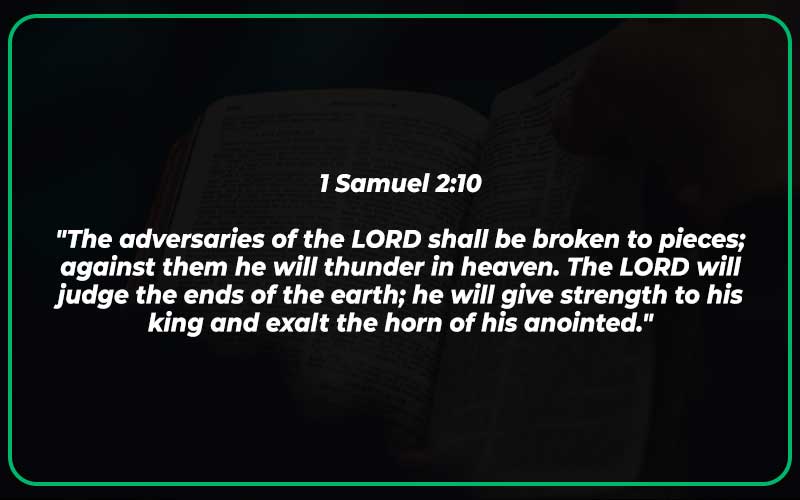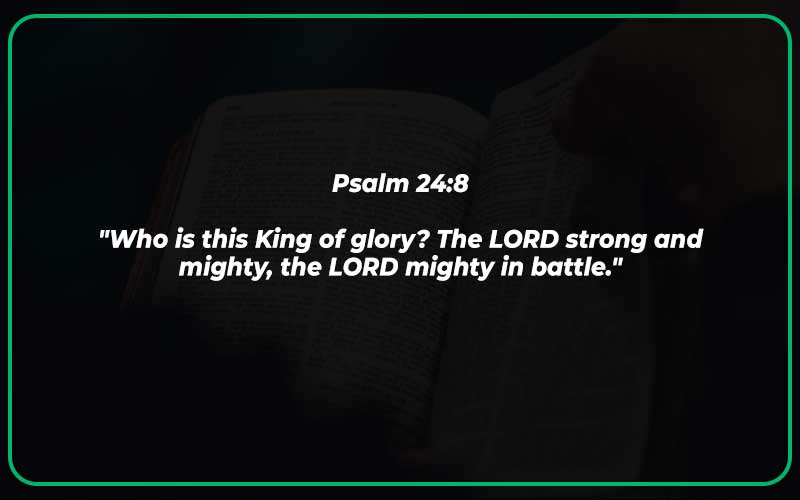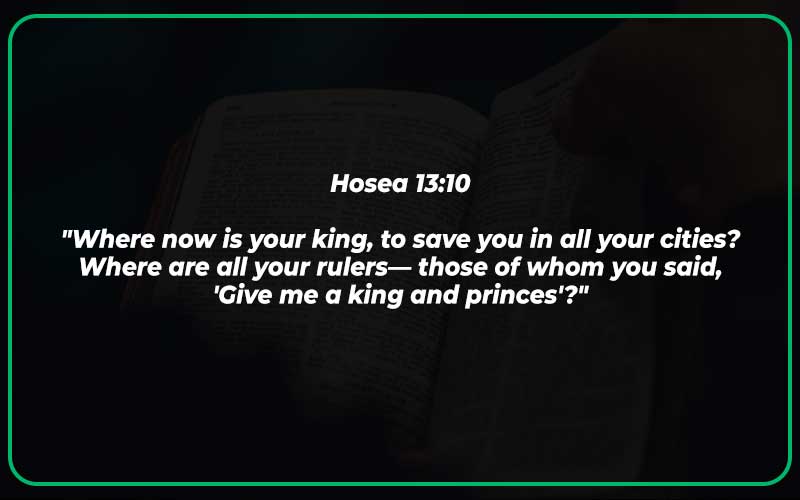Throughout history, kings have played a crucial role in leading and governing nations. The Bible contains a wealth of stories about kings and their reigns, with some being commendable and others less so.
Nevertheless, the Bible also offers great guidance to those in positions of authority through numerous verses that provide wisdom and direction for rulers.
These verses offer insights into the responsibilities of a leader, guiding them to rule with fairness and justice. The Bible is saturated with inspirational texts that can inspire anyone in leadership positions to lead with integrity and righteousness.
Some of the most powerful and inspiring Bible verses about kings and their leadership will be explored in this article.
Bible Verses About Kings
Proverbs 21:1
“The king’s heart is in the hand of the LORD, as the rivers of water: he turneth it whithersoever he will.”
This verse emphasizes the ultimate sovereignty of God over even the highest earthly authority, represented here by the king. The metaphor of the king’s heart being guided like a river underscores that, regardless of human intentions or actions, God’s will prevails. It’s a comforting reminder of God’s control, even amidst the unpredictable nature of human governance.
1 Samuel 2:10
“The adversaries of the LORD shall be broken to pieces; against them he will thunder in heaven. The LORD will judge the ends of the earth; he will give strength to his king and exalt the horn of his anointed.”
This verse encapsulates the idea of divine retribution and the favor God shows to righteous leadership. God’s justice is profound, and He actively defends and strengthens His chosen leaders (kings). This verse underscores that God empowers and uplifts His chosen kings, reaffirming the concept of the “divine right of kings”.

1 Timothy 2:1-2
“I urge, then, first of all, that petitions, prayers, intercession, and thanksgiving be made for all people— for kings and all those in authority, that we may live peaceful and quiet lives in all godliness and holiness.”
This verse explicitly instructs Christians to pray for those in authority, including kings. It underscores the importance of praying for peaceful and righteous governance. The verse also denotes the influence of a king’s decisions on societal tranquility and suggests that prayer can be a powerful tool for influencing good leadership.
Also Read: 21 Bible Verses About Positive Attitude (With Commentary)
Ecclesiastes 10:20
“Do not revile the king even in your thoughts, or curse the rich in your bedroom, because a bird in the sky may carry your words, and a bird on the wing may report what you say.”
This verse speaks to the power of words and thoughts, cautioning against speaking ill of the king or the wealthy. It metaphorically cautions that our words, even spoken in private, can have unintended consequences. It’s a call for respect towards authority and a reminder of the potential power and reach of our words.
Romans 13:1
“Let everyone be subject to the governing authorities, for there is no authority except that which God has established. The authorities that exist have been established by God.”
This verse reiterates the concept of divine authority. It suggests that all earthly authority, including kings, is ultimately established by God. This verse urges believers to respect and submit to their governing authorities, understanding that they are part of God’s plan.
Revelation 17:14
“They will wage war against the Lamb, but the Lamb will triumph over them because he is Lord of lords and King of kings—and with him will be his called, chosen and faithful followers.”
The Lamb, representing Jesus in Revelation, is depicted as the ultimate King, victorious over all earthly and spiritual opposition. This verse speaks to Christ’s ultimate authority and victory, and the promise of triumph for those who are His faithful followers.
1 Peter 2:17
“Show proper respect to everyone, love the family of believers, fear God, honor the emperor.”
Peter, in this verse, guides Christians on how to live among others. He advises believers to show respect to everyone, irrespective of their status, and particularly emphasizes the need to honor the king (emperor). This verse encourages believers to live in harmony with society while prioritizing their reverence for God.
Daniel 2:21
“He changes times and seasons; he deposes kings and raises up others. He gives wisdom to the wise and knowledge to the discerning.”
This verse, placed in the context of King Nebuchadnezzar’s dream interpretation, highlights God’s supreme control over time, seasons, and the rise and fall of kings. It serves as a reminder that wisdom and knowledge come from God, and it’s He who sovereignly directs the course of history.
Psalm 47:7-8
“For God is the King of all the earth; sing to him a psalm of praise. God reigns over the nations; God is seated on his holy throne.”
In these verses, God is presented as the ultimate King, ruling over the entire earth and all nations. This passage is a call to praise God, acknowledging His supreme authority and reign. It emphasizes the majesty of God and His righteous rule over all creation.
Revelation 19:16
“On his robe and on his thigh he has this name written: KING OF KINGS AND LORD OF LORDS.”
This verse, from the book of Revelation, reveals a victorious image of Christ, emphasizing His ultimate authority as the King of Kings and Lord of Lords. It’s a powerful reminder of Christ’s supreme authority over all rulers, kingdoms, and authorities, both earthly and heavenly.
Matthew 2:2
“Where is the one who has been born king of the Jews? We saw his star when it rose and have come to worship him.”
This verse recounts the wise men’s search for the newborn King of the Jews, Jesus. The verse encapsulates a momentous event in history that recognizes Jesus as the promised King. It reminds us of Jesus’s earthly kingship and the recognition of His divine authority by those who sought to worship Him.
Psalm 2:6
“I have installed my king on Zion, my holy mountain.”
In this verse, God is speaking through the psalmist about the installation of His chosen king in Zion, symbolic of Jerusalem. This verse is often seen as a prophetic foreshadowing of the enthronement of Jesus Christ, God’s anointed King.
Psalm 24:8
“Who is this King of glory? The LORD strong and mighty, the LORD mighty in battle.”
This verse is part of a psalm of praise to God, exalting Him as the ‘King of Glory’. The title conveys God’s supreme power, strength, and authority. The verse serves as a potent reminder of God’s might, especially in the face of battles and trials.

Proverbs 8:15-16
“By me kings reign and rulers issue decrees that are just; by me princes govern, and nobles—all who rule on earth.”
These verses personify wisdom as the guiding force behind just and effective governance. It’s a profound reminder that true wisdom, which is from God, is foundational for justice and righteousness in leadership, including kings and all who hold authority.
Deuteronomy 17:18-20
“When he takes the throne of his kingdom, he is to write for himself on a scroll a copy of this law, taken from that of the Levitical priests. It is to be with him, and he is to read it all the days of his life so that he may learn to revere the LORD his God and follow carefully all the words of this law and these decrees and not consider himself better than his fellow Israelites and turn from the law to the right or to the left.”
These verses set out God’s instructions for the kings of Israel, emphasizing the importance of humility, adherence to God’s law, and the avoidance of a sense of superiority. It underlines the role of a king not as a dictator but as a humble servant of God and His laws.
1 Samuel 8:7
“And the LORD said to Samuel, ‘Obey the voice of the people in all that they say to you, for they have not rejected you, but they have rejected me from being king over them.'”
This verse captures a moment of rejection of God’s kingship by the Israelites, who desired a human king. It serves as a stark reminder of humanity’s tendency to reject God’s rule, seeking comfort in human authority. It encourages us to embrace God as our true King.
1 Kings 3:9
“Give your servant therefore an understanding mind to govern your people, that I may discern between good and evil, for who is able to govern this your great people?”
Here, Solomon’s prayer for wisdom to rule effectively highlights the need for discernment in leadership. This verse underscores that wisdom, particularly in discerning good from evil, is a divine gift crucial for those in positions of power, such as kings.
Psalm 29:10
“The LORD sits enthroned over the flood; the LORD is enthroned as King forever.”
This verse reiterates God’s sovereignty, depicting Him as an eternal King, even over chaotic circumstances symbolized by the ‘flood’. It’s a reassurance of God’s unending reign and His control over all circumstances, both peaceful and turbulent.
Jeremiah 10:10
“But the LORD is the true God; he is the living God, the eternal King. When he is angry, the earth trembles; the nations cannot endure his wrath.”
This verse emphasizes the uniqueness of the Lord as the ‘true God’ and ‘eternal King.’ It portrays God’s mighty power, causing the earth to tremble in His anger. It reminds us of God’s supremacy and the vast difference between human kings and God, the eternal King.
Hosea 13:10
“Where now is your king, to save you in all your cities? Where are all your rulers— those of whom you said, ‘Give me a king and princes’?”
This verse, from the prophet Hosea, is a direct challenge to the Israelites who had rejected God as their King. It serves as a reminder that human kings and leaders cannot provide the salvation and deliverance that only God can. It’s a call to recognize and submit to God’s ultimate authority.

Luke 23:3
“And Pilate asked him, ‘Are you the King of the Jews?’ And he answered him, ‘You have said so.'”
In this verse, Jesus confirms His kingship during His trial before Pilate. Despite His humble and suffering appearance at the time, Jesus’s affirmation of His kingship is a powerful testament to His divine authority and role as the promised Messiah and King.
What Does the Bible Say About Kings?
In the Bible, the concept of kingship holds significant cultural, political, and theological importance. Throughout the Old and New Testaments, the role of kings is explored in various contexts. Here are some key themes and ideas that the Bible presents regarding kings:
- God’s Sovereignty and Human Kingship: The Bible often portrays God as the ultimate ruler and king over all creation. However, at times, God allows the establishment of human kings to govern nations. The establishment of kings is seen as both a concession to human desires and a test of obedience to God’s guidance.
- Responsibility and Leadership: Kings are often depicted as having both a political and spiritual responsibility to lead their people justly. They are expected to uphold laws, protect the weak, and promote righteousness. Many examples, such as King David and King Solomon, showcase the tension between successful leadership and moral failings.
- Warnings and Cautionary Tales: The Bible contains cautionary tales of kings who failed to follow God’s commands, leading to the downfall of their kingdoms. The story of King Saul’s disobedience and downfall serves as an example of how pride and disobedience can lead to dire consequences.
- Prophet-King Relationship: Prophets often played a crucial role in guiding and advising kings. Prophets like Samuel, Nathan, and Elijah confronted kings when they strayed from God’s path, emphasizing the importance of accountability and spiritual guidance.
- Messiah as King: The Bible prophesies about a future “Messiah,” often referred to as the “Anointed One,” who will establish a righteous and everlasting kingdom. Jesus Christ is seen by Christians as the fulfillment of this Messianic prophecy, being both a spiritual and eternal king.
- Kingdom of God: The New Testament introduces the concept of the “Kingdom of God,” which refers to the rule of God in people’s hearts and lives. This concept transcends earthly kingship and emphasizes a spiritual relationship with God.
- Servant Leadership: Jesus, often referred to as the “King of Kings,” exemplified a different kind of kingship. He taught about servant leadership, where the greatest leader is the one who serves others selflessly.
In summary, the Bible presents a nuanced perspective on kings and kingship. It acknowledges human tendencies, both good and bad, in leadership while emphasizing the ultimate sovereignty of God and the importance of righteous and humble leadership.
Also Read: 21 Bible Verses About Guilt (With Commentary)
Final Thoughts
The Bible discusses the roles of kings in society. It features stories of good and bad kings such as Solomon’s wisdom in leading his kingdom and David’s faithfulness to God.
Keep in mind that God is the ultimate ruler and even earthly kings will answer for their actions on Judgment Day. The Bible can help us act justly, humbly, and according to God’s will whether we are leaders or subjects.
We should strive to follow these teachings and honor God with our lives.

